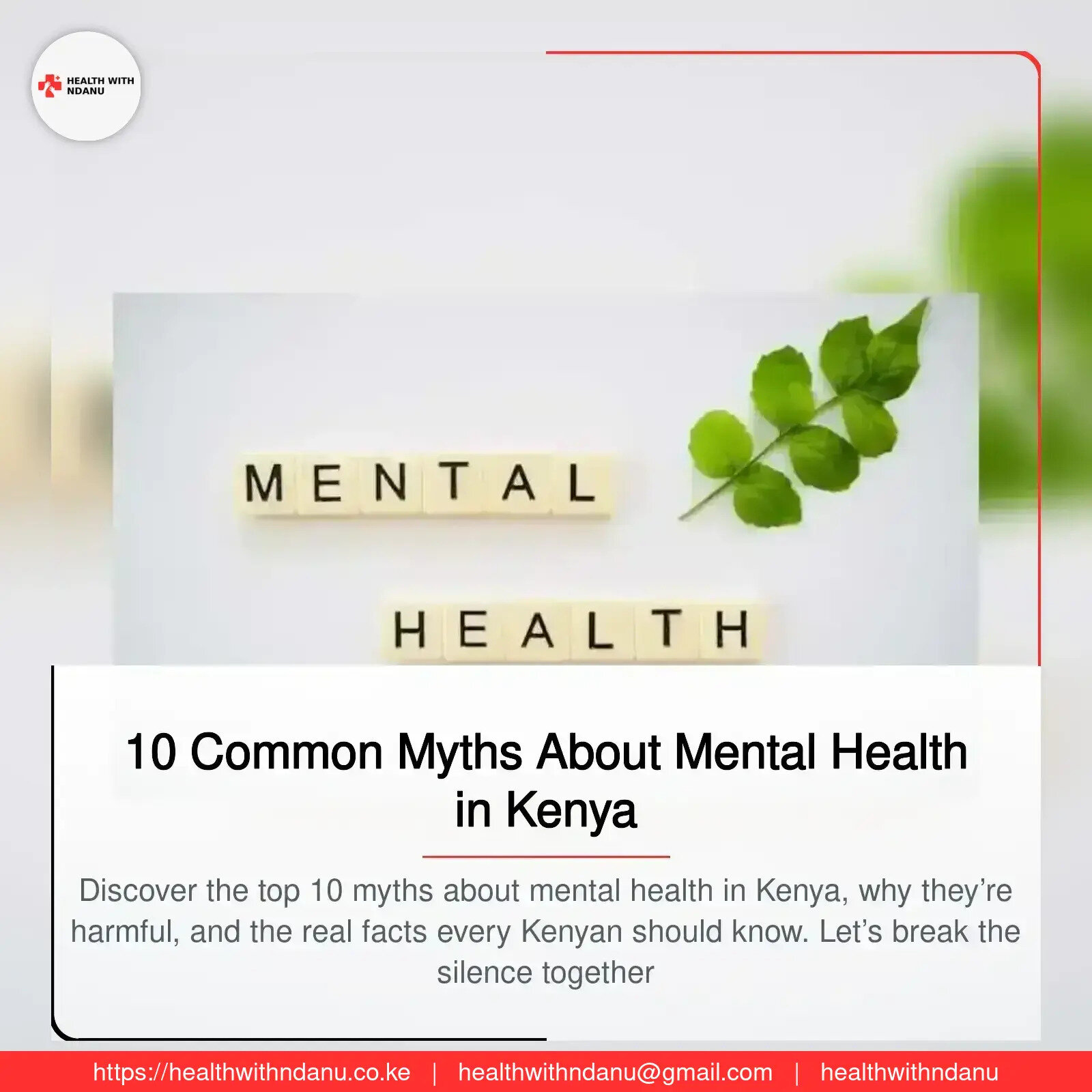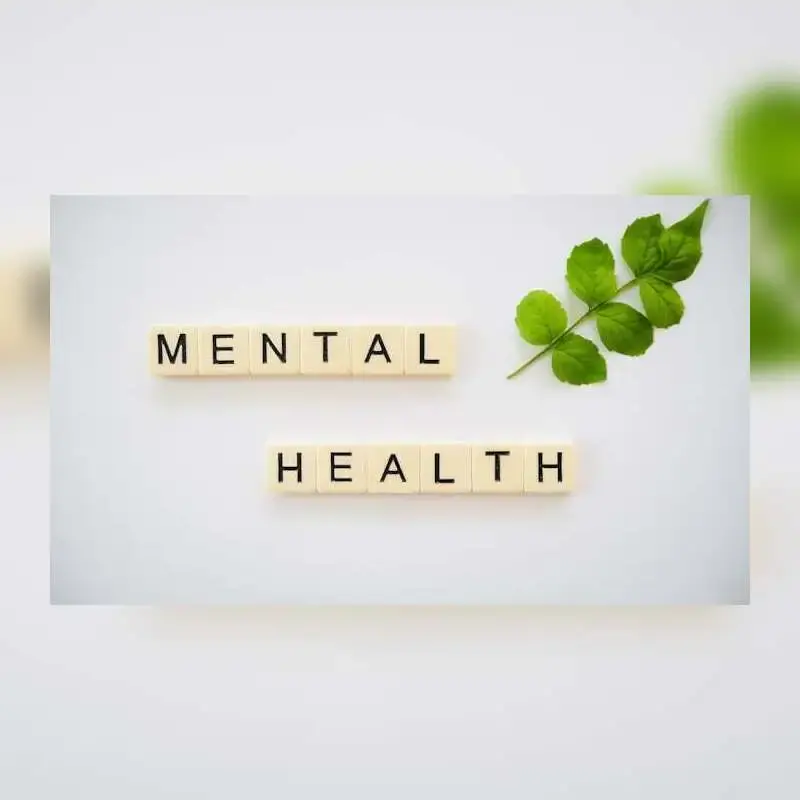10 Common Myths About Mental Health in Kenya
- by Diana Ndanu
- 10 April, 2025
- 0 Comments
- 6 Mins



Let’s Talk: Myths About Mental Health in Kenya
By HealthWithNdanu.co.ke
Mental health is one of those topics that people in Kenya often avoid. It’s like a quiet elephant in the room—everyone knows it’s there, but nobody wants to talk about it. Yet, the truth is, mental health affects millions of Kenyans every day. From depression and anxiety to trauma and substance abuse, mental health challenges are real—and so are the myths that surround them.
In this article, we’re going to debunk common mental health myths in Kenya, talk openly, and share facts that could literally change someone’s life.
Why We Need to Talk About Mental Health in Kenya
Let’s face it: for many of us, mental health is still misunderstood. It’s surrounded by taboo, stigma, and misinformation. This silence has led to:
- People suffering in silence.
- Families hiding loved ones with mental illnesses.
- Individuals turning to unhealthy coping methods like alcohol, drugs, or isolation.
It’s time to break the silence. Let’s start with the most common myths we’ve heard—and the truths behind them.
Myth #1: Mental illness is a result of witchcraft or curses
The truth:
Mental health disorders have biological, psychological, and social causes. Depression, bipolar disorder, schizophrenia—these are not caused by dark magic, evil spirits, or curses from your enemies.
Sadly, many people in rural Kenya still believe mental illness is spiritual punishment. This leads families to seek help from witch doctors or traditional healers instead of mental health professionals.
Let’s normalize this: Going to a counselor or psychiatrist is not a sign of weakness. It’s a sign of strength.
Myth #2: Only “mad” people need mental healthcare
The truth:
Mental illness is a spectrum, and everyone can struggle with their mental health—yes, even if you look “normal” on the outside.
Saying, “I’m not mad” is a way many Kenyans dismiss therapy or mental health services. But feeling overwhelmed, anxious, burned out, or hopeless are valid reasons to seek help. Just like you’d go to a doctor for malaria, it’s okay to go to a counselor for your emotions.
Myth #3: Depression is just being sad—you'll get over it
The truth:
Depression is a medical condition that affects how you think, feel, and function. It’s not just sadness. It can last for weeks, months, or even years if untreated.
Many Kenyans dismiss someone’s depression as laziness or moodiness. But depression can lead to:
- Sleep problems
- Loss of interest in life
- Suicidal thoughts
Quick fact: According to WHO, suicide is the fourth leading cause of death among 15–29-year-olds worldwide—and Kenya is no exception.
Myth #4: Men don't suffer from mental health issues
The truth:
- Men suffer too—they just don’t talk about it.
- Kenyan men are taught to be “tough,” not to cry, and never show emotion. As a result, many suffer silently from depression, anxiety, PTSD, and substance abuse.
- Men are more likely to die by suicide because they don’t speak up or seek help.
- Let’s change the script. It’s okay for men to talk about their feelings and seek therapy. Real men heal.
Myth #5: Therapy is for the rich or the weak
The truth:
Therapy is for anyone who wants to live a healthier life—mentally, emotionally, and even physically.
Sure, private therapists can be costly, but there are affordable and even free mental health services in Kenya, especially through:
- Public hospitals
- Community health programs
- University counseling centers
- NGOs like Befrienders Kenya and Red Cross Kenya
- Mental health support isn’t a luxury. It’s a necessity.
Myth #6: Prayers and faith alone can cure mental illness
The truth:
- Faith and prayer are powerful, but mental illness also needs medical and psychological support.
- In Kenya, many people are told to “just pray” when they express emotional distress. While spiritual guidance is important, mental health professionals are trained to provide evidence-based solutions.
- We need both: faith and therapy. Just like we go to a doctor for physical pain, we can go to a counselor for mental pain—and still pray through it.
Myth #7: Children and teens don’t experience mental health problems
The truth:
- Kids and teens in Kenya are under enormous pressure—from school, family, poverty, and social media. They are not immune to stress, anxiety, depression, or trauma.
- Unfortunately, most Kenyan schools and homes are not equipped to support children’s emotional needs. Children with behavioral issues are punished instead of helped.
- Let’s teach kids that it’s okay to talk about feelings and ask for help early. Mental health education should start in primary school.
Myth #8: Mental illness is caused by personal weakness
The truth:
- Mental illness is not a character flaw. It is not your fault.
- Blaming someone for having depression is like blaming someone for having diabetes. People don’t choose to have mental illness—it’s a mix of brain chemistry, environment, and life events.
- We must replace shame with support. Instead of asking “what’s wrong with you?”, let’s ask “how can I support you?”
Myth #9: People with mental illness are violent or dangerous
The truth:
- Most people with mental health conditions are not violent. In fact, they’re more likely to be victims of violence or abuse than perpetrators.
- Movies and news reports often portray people with mental illness as dangerous. This increases stigma and makes people afraid to seek help.
- Let’s stop the fear and start the facts. People with mental health conditions deserve compassion, not judgment.
Myth #10: You can’t recover from mental illness
The truth:
- Recovery is possible.
- With proper treatment—whether it’s therapy, medication, support groups, or lifestyle changes—many people recover and live full, meaningful lives.
- Just like any chronic illness, managing mental health is a journey. And with support, anyone can bounce back.
Let’s Break the Silence—Together
Mental health in Kenya needs open conversations—not whispers in the dark. By busting myths, we can:
- Reduce stigma
- Encourage early treatment
- Save lives
Here’s what you can do:
1. Talk about mental health with your friends, family, and community.
2. Share helpful content on social media (like this article).
3. Seek help if you or someone you know is struggling.
4. Support organizations that promote mental health awareness in Kenya.
Mental Health Support Services in Kenya
Here are some places you or someone you care about can reach out to:
- Befrienders Kenya – befrienderskenya.org
- Chiromo Hospital Group – Offers professional psychiatric care.
- Red Cross Kenya – Community counseling and crisis support.
- Mental 360 Kenya – Youth-focused mental health support.
- Public County Hospitals – Many now have mental health units.
Final Words: Let’s Normalize Mental Health Conversations
- Mental health is part of health. Just like we talk openly about malaria or diabetes, it’s time to talk about depression, anxiety, bipolar, and PTSD without shame.
The more we talk, the more we heal.
Was this article helpful? Share it on WhatsApp, Facebook, or Twitter. Let’s reach more people and build a mentally healthy Kenya.
Visit HealthWithNdanu.co.ke for more health education articles, posters, and real-life solutions that matter.
Got Your Own Experience? Share with us
Popular Categories
Most Visited Blogs
Daily Newsletter
Get all the top stories from Blogs to keep track.



